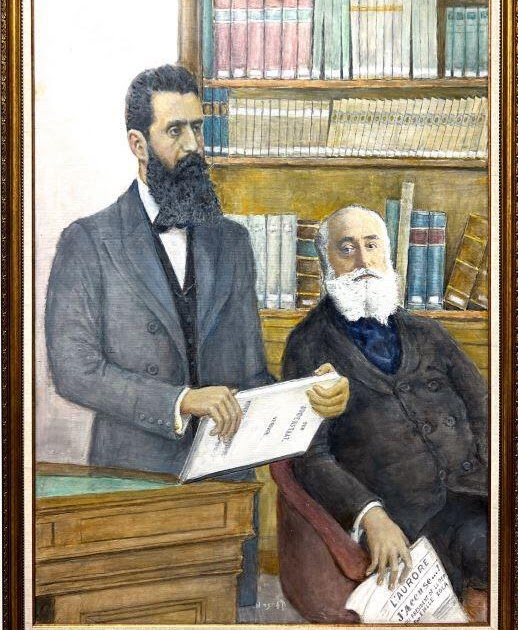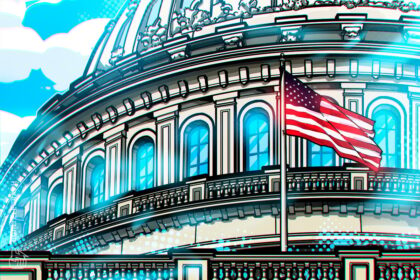And all the hope within you dies…
Humanity without a God, without arbitrary sovereignty and without egotism, will be incomparably more moral than the humanity of to-day which ‘puts its trust in God and keeps its powder dry.’ – Max Nordau, Conventional Lies of Our Civilization, p. 342.
Another point on which Nordau and I agreed was that only anti-Semitism had made Jews of us. – Theodor Herzl, The Complete Diaries, p. 196.
In November 1895, Herzl came to see Nordau, and read his book to him. His first words were: “Schiff says that I’m insane.” For three successive days he came back, reading, explaining, arguing. Max Nordau listened, answered, discussed. The idea pierced him like a sword of light. The air vibrated about those two. Herzl, the younger of the two, with his handsome Assyrian head, was anguished, fevered, up-lifted by his faith and his ardor. The older man watched him out of the grey eyes which burned in his white-bearded face. He curbed himself, but he was overcome and impressed. At last he rose and opened his arms to his trembling friend: “If you are insane, we are insane together. Count on me!” – Max Nordau A Biography, by Maxa and Anna Nordau, p. 120.
Schiff was right. Herzl was suffering from a Messiah complex.
On many other occasions, too, madmen come to see me. I am haunted by Messiahs of every stripe. The latest thing is a “Jesus Christ’’ named Lichtneckert who writes me in an otherwise intelligent letter that I am Elijah, his Elijah… – Herzl, p. 876.
Today the thought arises in me that I may be solving much more than the Jewish Question. Namely, tout bonnement [very neatly], the social question! – Herzl, p. 96.
The Exodus under Moses bears the same relation to this project as a Shrovetide Play by Hans Sachs does to a Wagner opera. – Herzl, p. 38.
Nuttier than a fruitcake. As the title and its following lines imply, I see the Herzl/Nordau mind-meld through a Coen brothers movie lens. Here we have two assimilated, secular Austro-Hungarian Jews who anti-semitism has made into Jews, which they understand (like the anti-semites) in a racial, nationalist sense, not a religious one.The notion of the white-beard psychiatrist being swept away by his ostensible patient’s mania is at once both tragedy and farce.
The funny bits are funnier once one has been introduced to Dr. Nordau’s peculiar pedantry. I first encountered it in an excerpt from Eli Valley’s Museum of Degenerates: Portraits of the American Grotesque. Valley makes the common mistake of back-casting subsequent appropriations and excesses of “degeneration” and Zionism to Nordau and Herzl, which is unfair but understandable. A contemporary review by George Bernard Shaw, The Sanity of Art, is devastating enough. “My dear Tucker,” Shaw begins the first section:
I have read Max Nordau’s Degeneration at your request: two hundred and sixty thousand mortal words, saying the same thing over and over again. That is the proper way to drive a thing into the mind of the world, though Nordau considers it a symptom of insane “obsession’’ on the part of writers who do not share his own opinions. – G. B. Shaw, The Sanity of Art, p. 17.
One of those insane obsessions Nordau diagnosed in Degeneration was megalomania. Curiously, the Nordau of 1895 appears to have forgotten the pronouncement of the Nordau of 1892-93:
It is a phenomenon observed in every kind of mania, that it receives its special colouring from the degree of culture of the invalid, and from the views prevailing at the times in which he lived. The Catholic who is a prey to megalomania fancies he is the Pope; the Jew, that he is the Messiah; the German, that he is the Emperor or a field-marshal; the Frenchman, that he is the President of the Republic. In the persecution-mania, the invalid of former days complained of the wickedness and knavery of magicians and witches ; to-day he grumbles because his imaginary enemies send electric streams through his nerves, and torment him with magnetism. The degenerates of to-day chatter of Socialism and Darwinism, because these words, and, in the best case, the ideas connected with these, are in current use. These so-called socialist and freethinking works of the degenerate as little advance the development of society towards more equitable economic forms, and more rational views of the relations among phenomena, as the complaints and descriptions of an individual suffering from persecution mania, and who holds electricity responsible for his disagreeable sensations, advance the knowledge of this force of nature. Those obscure or superficially verbose works which pretend to offer solutions for the serious questions of our times, or, at least, to prepare the way thereto, are even impediments and causes of delay, because they bewilder weak or unschooled brains, suggest to them erroneous views, and make them either more inaccessible to rational information or altogether closed to it. – Max Nordau, Degeneration, p.44.











